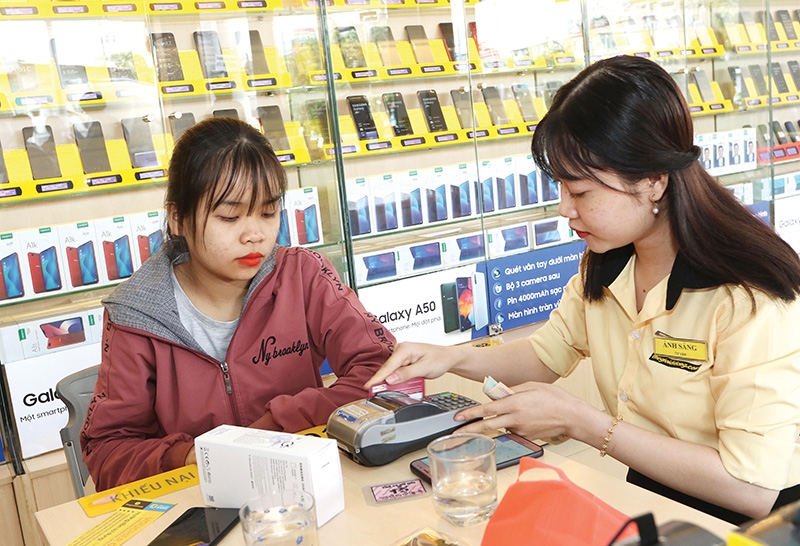Shortages derailing top tech retailers
 |
| Customers may see prices for electronics increasing significantly towards the end of the year. Photo: Le Toan |
“The shortfall in supply of smartphones and laptops was foreseen when the global chipset crisis reached its peak early this year,” said Dang Thanh Phong, head of communications at Mobile World.
Phong explained that to cope with the adversity, the retailer had consistently stored goods to serve the work-from-home demand as the pandemic expanded. However, how to contrive a supply of goods from the third quarter is now questionable as stockpiles have been reducing.
Nguyen The Kha, managing director of FPT Shop’s Mobile Telecom Department, admitted that preparing goods for sale during the third quarter is expected to be tricky because its inventory as of late May was enough for operations for only 30-45 days before new orders landed.
For smaller retailers, including those selling parallel imports, the adversity is similar. Talking to VIR, Dang Quoc Tuan, director of iShop Vietnam – which specialises in Apple’s parallel imports – said that it has experienced depletion since the first quarter this year.
“The supply of Apple items in Singapore and Hong Kong are reducing, so it has been hard to purchase enough goods,” said Tuan. “Additionally, the local interest in Apple products has fallen away due to COVID-19. For old Apple models, we have carried out many sales promotions but failed to lure in customers like in previous years.”
The shortage of smartphones and laptop items have also ballooned prices significantly. In a letter sent to partners in Vietnam, Taiwan-based laptop maker Acer noted that its plan of growing laptop prices will take place imminently due to the enlarging costs for manufacturing spare parts.
To date, the local prices of some Acer laptop models are up nearly 5-10 per cent, to as much as $1,000. Taiwanese laptop rival Asus recently published a scheme of increasing laptop prices by 5-10 per cent from the second quarter also, for the same reasons.
Meanwhile, American giant Dell has yet to reveal any similar plan during this time. However, its current laptop products are on trade at prices increasing by up to $100 against last year.
“Local consumers will experience the soaring costs for laptops as of the end of this year,” said Nguyen Ngoc Dat, managing director of the Di Dong Viet chain. “These laptop prices depend on the speed of recovery in manufacturing hubs across the globe.”
Nguyen Lac Huy from the Communications Department of CellphoneS said that goods have been preferred for export to the United States and the European Union where working from home had been mostly compulsory for a long period of time. The situation has therefore impacted the shipment of goods to Vietnam.
Marco Förster, international business advisory manager from Dezan Shira & Associates, believed that the shortage of laptop and smartphone products has more to do with the global semiconductor supply crunch and only partly with the current outbreak in Vietnam.
“With plenty of nations implementing stricter social distancing measures amidst the spread of the health crisis, employers and also educational institutions are forced to send their staff and students home,” said Förster. “This has caused the rising domestic demand for laptops and electronic equipment.”
The serious shortage of semiconductors has led electronics manufacturers to cut production and lay off workers. Apple’s latest iPhone came with month-long delays and similarly, the release of Samsung’s flagship Galaxy model has been delayed to Q4 of this year.
Förster claimed that the shortage will likely follow well through 2022 as Taiwan’s TSMC, which is controlling close to 54 per cent of the foundry market since the third quarter of 2020, cannot find a short-term solution to manage the bottleneck caused by the semiconductor product shortage.
It is expected that mass vaccination efforts during the pandemic will eventually lead to recovery in supply of such electronic items. With Intel increasing its Vietnam chip investment by nearly 50 per cent earlier this year and Taiwanese Apple supplier Foxconn eyeing a $700 million expansion of its operations in the country, Vietnam hopes to find itself amidst the web of tech-supply chains.
“These facilities are growing not just as a countermeasure to the current chip crunch but also as an act to diversify supply chains out of China. If slow vaccinations continue to cause these facilities to run at limited capacities it will have an additional negative effect on the electronics market,” Förster stated.
Market intelligence group TrendForce expected global laptop shipment for 2021 to reach 217 million units, an 8.1 per cent increase on-year.
TrendForce believed that this year will likely see a relatively strong wave of device replacement demand as well as growth in emerging markets. Assuming that materialises, global smartphone production for 2021 is forecasted to increase by 9 per cent to 1.36 billion units.
What the stars mean:
★ Poor ★ ★ Promising ★★★ Good ★★★★ Very good ★★★★★ Exceptional
Related Contents
Latest News
More News
- VNPAY and NAPAS deepen cooperation on digital payments (February 11, 2026 | 18:21)
- Vietnam financial markets on the rise amid tailwinds (February 11, 2026 | 11:41)
- New tax incentives to benefit startups and SMEs (February 09, 2026 | 17:27)
- VIFC launches aviation finance hub to tap regional market growth (February 06, 2026 | 13:27)
- Vietnam records solid FDI performance in January (February 05, 2026 | 17:11)
- Manufacturing growth remains solid in early 2026 (February 02, 2026 | 15:28)
- EU and Vietnam elevate relations to a comprehensive strategic partnership (January 29, 2026 | 15:22)
- Vietnam to lead trade growth in ASEAN (January 29, 2026 | 15:08)
- Japanese business outlook in Vietnam turns more optimistic (January 28, 2026 | 09:54)
- Foreign leaders extend congratulations to Party General Secretary To Lam (January 25, 2026 | 10:01)

 Tag:
Tag:




















 Mobile Version
Mobile Version